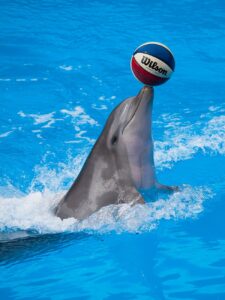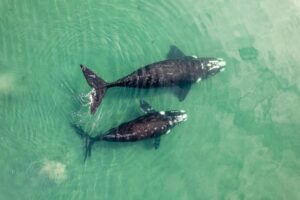If you’re seeking a breathtaking marine wildlife experience in Europe, whale watching in Ponta Delgada should be at the top of your travel list. Nestled in the Azores archipelago of Portugal, Ponta Delgada is widely regarded as one of the best whale-watching destinations in the world.
With over 25 species of whales and dolphins gracing the waters year-round, this coastal town offers an unforgettable opportunity to observe these magnificent creatures in their natural habitat.
Whether you’re a wildlife enthusiast, a photographer, or a nature-loving traveler, whale watching in Ponta Delgada offers a rare and awe-inspiring adventure that connects you with the wild heart of the Atlantic Ocean.
Why Choose Ponta Delgada for Whale Watching?
The Azores, a group of volcanic islands in the North Atlantic Ocean, are strategically located on the migratory paths of many marine species. Ponta Delgada, the capital of São Miguel Island, serves as the main hub for marine tours and expeditions.
The nutrient-rich waters surrounding the Azores attract a high diversity of cetaceans, including sperm whales, blue whales, fin whales, and several species of dolphins. The combination of deep oceanic trenches and temperate waters creates the perfect feeding grounds, making it possible to spot whales throughout the year.
Best Time for Whale Watching in Ponta Delgada
While some whale and dolphin species can be seen year-round, the best months for whale watching in Ponta Delgada are between April and October. During this period, the seas are calmer, and the chances of spotting many species in one trip are much higher.
Here’s a breakdown of what you might see by season:
- Spring (April to June): This is peak season for blue whales, fin whales, and sei whales. These massive baleen whales pass through the area during their annual migration.
- Summer (July to September): Sperm whales and a variety of dolphin species are most common during the summer months.
- Autumn and Winter (October to March): Whale watching tours still operate, but sightings may be less frequent and weather conditions less predictable.
Regardless of the season, you’re almost guaranteed to see dolphins, which are resident year-round and often follow the boats.
Top Whale Watching Tour Operators in Ponta Delgada
There are several reputable companies offering whale watching tours in Ponta Delgada, each with certified marine biologists on board to guide the experience. These tours are generally eco-conscious and focus on education, conservation, and minimal impact on marine life.
Some popular operators include:
- Futurismo Azores Adventures
- Picos de Aventura
- Terra Azul
- CW Azores
Most tours last between 3 to 4 hours and leave from the Ponta Delgada marina. Tour options range from rigid inflatable boats (RIBs) for a thrilling ride to larger, more stable catamarans that are ideal for families and those seeking comfort.
Booking in advance is recommended, especially during the high season.
What to Expect on a Whale Watching Tour
A typical whale watching tour in Ponta Delgada starts with a safety briefing and an educational session about the local marine ecosystem. Trained marine biologists and guides with each tour to provide real-time information and help identify species.
Once at sea, spotters located on high lookout points (called “vigias”) use binoculars to find whales and communicate their location to the boat crew. This traditional Azorean technique has been used since the whaling days but is now repurposed for responsible tourism.
Expect to see:
- Sperm whales, known for their deep dives and dramatic tail flukes
- Blue whales, the largest animals on Earth, visible in spring
- Common, bottlenose, and Risso’s dolphins, often playful and social
- Occasionally, orcas, pilot whales, and beaked whales
Tours operate under strict codes of conduct to ensure minimal disturbance to wildlife, often approaching slowly and maintaining a respectful distance.
Photography Tips for Whale Watching in Ponta Delgada
Capturing whales and dolphins in action can be challenging, but with a few tips, you can increase your chances of getting that perfect shot:
- Use a telephoto lens (200mm or more) to get close-up images without disturbing the animals.
- Set your camera to burst mode to capture many frames in quick succession.
- Use a fast shutter speed (1/1000s or faster) to freeze movement on choppy waters.
- Always protect your gear from salt spray and moisture with waterproof covers or bags.
Don’t forget to pause and enjoy the moment—sometimes the best memories are those not captured on camera.
Whale Watching and Sustainability in the Azores
The Azores are a global model for sustainable whale watching tourism. Local tour operators are required to follow regulations that protect marine life, and many are actively involved in research and conservation.
In fact, former whalers in the region have become some of the most passionate marine guides, sharing stories of the past while helping preserve the ocean’s future.
The Azores also take part in various international programs for cetacean monitoring and collaborate with organizations such as:
- WWF (World Wildlife Fund)
- Marine Mammal Society
- European Cetacean Society
When choosing a whale watching company, look for eco-certifications and sustainability pledges. Supporting these operators ensures the longevity of this precious natural resource.
Things to Do After Whale Watching in Ponta Delgada
Your marine adventure doesn’t have to end when you return to shore. Ponta Delgada offers a range of complementary activities and attractions:
- Visit the Portas da Cidade (City Gates) and explore the charming old town.
- Relax in a natural hot spring at Caldeira Velha or Furnas.
- Take a boat tour to nearby islets, or go snorkeling and diving in clear Atlantic waters.
- Enjoy fresh seafood and Azorean cuisine at local restaurants like A Tasca or Cais 20.
Many tours also offer combination packages, including whale watching, swimming with dolphins, or hiking in the island’s lush landscapes.
Practical Tips for Whale Watching in Ponta Delgada
To get the most out of your experience, here are a few helpful tips:
- Dress in layers. Weather at sea can be unpredictable.
- Bring sunscreen and sunglasses. The ocean reflection can intensify sunlight.
- Take motion sickness medication if you’re prone to seasickness.
- Pack water and snacks, especially for longer tours.
- Respect nature. Do not litter, feed, or touch marine life.
Also, don’t forget your sense of wonder—you’re about to witness one of the planet’s most majestic phenomena.
Is Whale Watching in Ponta Delgada Worth It?
Absolutely. Whale watching in Ponta Delgada offers a rare window into the wild, where humans can observe giant marine mammals in a setting that is both educational and awe-inspiring. The balance of natural beauty, responsible tourism, and local charm makes it one of the most enriching experiences the Azores has to offer.
Whether you’re traveling solo, as a couple, or with family, a whale watching trip will leave you with memories that last a lifetime. The opportunity to see the ocean’s giants up close in a place as pristine as Ponta Delgada is not just a travel experience—it’s a life experience.
Conclusion
In a world where authentic nature encounters are becoming increasingly rare, whale watching in Ponta Delgada stands out as a beacon of hope and inspiration. From its rich marine biodiversity to its sustainable tourism practices, this Azorean paradise offers more than just sightseeing—it offers connection.
Don’t miss your chance to witness the grace and power of whales in the wild. Book a whale watching tour in Ponta Delgada and prepare for a journey into the heart of the Atlantic, where nature still reigns supreme.


